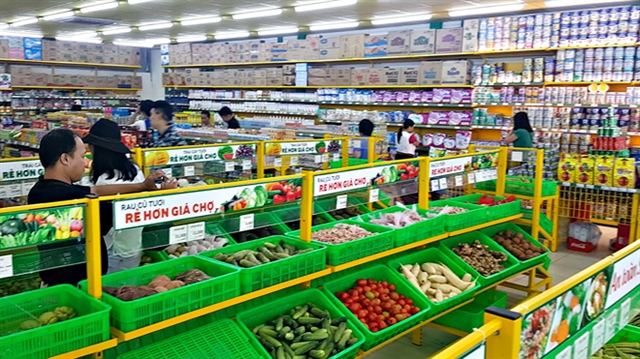 Economy
Economy

Vietnamese retail companies are in pole position to seize the lion’s share of the market, especially after some foreign businesses have left the country.

|
| Shoppers at a Bách Hóa Xanh store. Retailer Mobile World has shifted its focus on food and grocery retail to boost the business thanks to the retail market's growth prospects. — Photo tinnhanhchungkhoan.vn |
HÀ NỘI — Vietnamese retail companies are in pole position to seize the lion’s share of the market, especially after some foreign businesses have left the country.
With total sales of up to US$180 billion predicted for 2020, the Vietnamese retail market is drawing attention of international companies posing challenges for local firms.
According to the Ministry of Industry and Trade, total retail sales in the first seven months of this year was up 11.56 per cent year on year to VNĐ2.8 trillion ($120.4 million).
Between 25-30 per cent of the modern market is made up of foreign companies which include 15 per cent of shopping centres, 50 per cent of convenience stores and 10 per cent of minimarket retailing.
Meanwhile, the portion of Vietnamese produce in the retail system, especially supermarkets, is quite high.
According to the global measurement company Nielsen, Việt Nam’s retail market has a high growth rate that is supported by increasing per capita income, an emerging macro-economy and ratified free trade agreements (FTAs).
Đinh Thị Mỹ Loan, chairwoman of the Association of Vietnam Retailers, said market conditions are becoming better for modern retailing, which is convenient, fast and integrated with traditional retailing.
The exit of foreign companies such as Auchan and Shop & Go proves domestic retailers have become stronger and have a bigger stake in the domestic market, she said.
Business insiders and analysts have said the Vietnamese retail market will get more competitive with local firms being more aggressive, proactive and well-positioned.
Vietnamese firms understand the taste and demand of Vietnamese consumers, giving them an advantage over foreign companies, according to Trần Duy Đông, director of Domestic Market Department under the Ministry of Industry and Trade (MoIT).
Young population, high demand of getting connected and rapid urbanisation are among other factors that could drive the retail market up.
The regulation of economic needs test (ENT) is still being carried out, which is considered a good tool and a technical barrier to limit the participation of foreign retailers while supporting local companies.
But they must maximise their strengths now to seize the market as ENT regulation will be eliminated in accordance to the FTAs and trade pacts to which Việt Nam is a member.
According to the market research firm Savills, the Vietnamese retail market will be developing steadily by 2021 thanks to increased demand for entertainment, modern shops and minimarkets, and apparel and textile, which are forecast to grow at annual rates of between 6 per cent and 10 per cent.
Vũ Vinh Phú, chairman of the Hà Nội Supermarket Association, said multi-channel retailing will dominate the market in the future. The model combines shopping centres with other services such as catering and entertainment. Therefore, small companies should form alliances to make the most of their strengths.
MoIT official Đông said the Fourth Industrial Revolution is changing the manufacturing industry and has a significant impact on how companies operate. Therefore, the shortest path for local firms to accelerate is by gaining access to advanced technologies to enhance their productivity and product qualities.
Looking to the future, the virtual and visual retailing model has been launched by local firms to get the quickest access to consumers. Those firms are trying to introduce technological applications so that consumers are able to approach their products and services in the fastest and most convenient way.
Speeding up
Starting August, Vietnamese retail companies are finding ways to up their sales as consumers have high purchasing power in the final months of the year to prepare for year-end holidays.
FPT Retail and Mobile World Investment Corporation (Mobile World) – among the biggest retailers in the country – are exploring new segments to reduce their dependence on digital and electronic sales.
In the first six months of 2019, FPT Retail earned VNĐ158 billion in post-tax profit. The figure was not even close to half of the company’s full-year target, which was set at VNĐ418 billion.
After the first half of the year, Mobile World has fulfilled about half of its full-year revenue and post-tax profit plans. The figures were VNĐ51.7 trillion and VNĐ2.12 trillion, up 16 per cent and 38 per cent year on year.
Both firms have seen a decline in cellphone sales as the ongoing trade war between the US and China has dampened sales of Chinese products.
In the near future, cellphones will not be the key business for those firms. The German market research institute GfK forecasts the cellphone market is saturating with the sector growth being only 1-2 per cent this year.
In the long term, Mobile World will focus on developing its consumer retail chain Bách Hóa Xanh with expectations that food and beverage sales will be equal to that of electronics and cellphones in two years.
The grocery chain may reach its break-even point in the fourth quarter of 2019, VNDirect Securities Corp (VNDS) said in a note. The expansion of the retail network will get faster than expected and the number of new stores will reach 700 at the end of the year.
VNDS estimates each Bách Hóa Xanh store will record VNĐ1.6 billion of sales each month. And by the end of the fourth quarter, the chain’s gross profit margin will be 20 per cent thanks to increases in sales of fresh food at the stores outside HCM City.
Meanwhile, FPT Retail has shift its attention to pharmaceutical sector after it completed investing in the drug store chain Long Châu. The company plans to build 470 drug stores in 2021 with total sales of VNĐ4.4 trillion. — VNS




